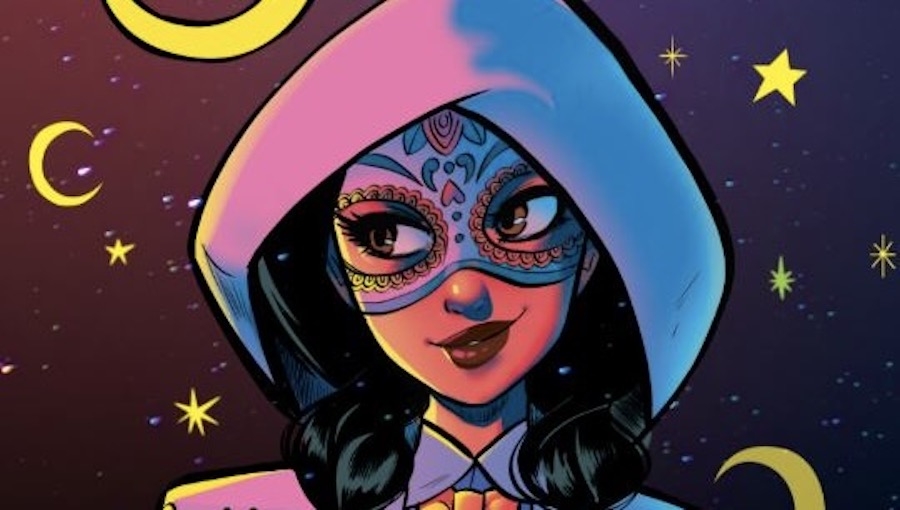When I reviewed Jalisco in 2019, I was unaware that the plucky, determined young dancer would be the first member of a superhero team representing young women from different countries and backgrounds along the Latinx spectrum. Phoenix Studios saw the need for more representation in the genre (and they are not wrong!), and I presume loved Jalisco so much that one book wasn’t enough for her story. Santa and Loquita are the latest additions to this universe where young women possess powers to change the world, often through connecting to their cultural roots and loving their familias and compatriots.
In Santa, the titular heroine lives in a fictional border town in Texas with her abuelitos and struggles to deal with problems such as an unreliable car and a broken phone; however, the dark undercurrent in the community is racial tension between immigrants and US locals. One of the candidates for the upcoming election, Illena Chavez-Estevez (No, those initials are not accidental.), espouses racial division and will do everything she can to keep Dona Acevedo and her progressive belief in rights for all from winning. Santa must embrace her late mother’s fighting spirit and learn how to use both her strength and passion for social justice to protect immigrants and take down the borderland concentration camps.
Zully, the protagonist in the most recent addition to the A La Brava universe, has an intact family (father, mother, and younger sister) but struggles when she gains the ability to see spirits (good, neutral, and evil) with her first period. Her public outbursts at school get the teenager nicknamed “Loquita” (roughly “little crazy one”), but when her ability helps protect her sister from harm, Zully embraces her strangeness and decides to actively seek out those in need of her help.
Santa and Zully are vastly different characters and face different challenges as they take up superhero mantles. One is a social justice warrior in a town divided between acceptance and racism (expertly portrayed with competing luchador groups) who represents the type of hero who rises to the occasion through hard work and dedication. (Santa has prophetic dreams, but she learns how to fight and challenge the system.) The other gains special abilities through genetics (It’s hinted that Zully’s grandmother also could see demons, etc.) and has parents actively pushing her to learn MMA; however, both young women are receptive to helping others, and they have strong ties to the family they have left.
Santa directly attacks the conditions facing immigrants at the southern US border and criticizes the racism and biases used to justify the situation, even from Latinx US citizens; however, because it tackles serious real world issues, I sometimes felt heavy digesting the themes. Ultimately, Santa prevails, but I carry the messages with me and want to help my state change its attitude toward the people on our borders.
In contrast, Loquita presents a somewhat lighter tale (if you ignore one of the major events at the climax) of a teenager learning how to be an adult as her body changes (at least most of us don’t start seeing visions/apparitions…at least I didn’t…). As I stare into the face of perimenopause, I don’t relate as well to stories about the onset of menstruation, but it’s a frightening, unsettling time for many girls, so I understand the power of stories that normalize puberty. I particularly loved Zully’s father’s openness about purchasing pads for his daughter since media frequently shows men having discomfort with anything dealing with menstruation.
While Eva Cabrera created the art for both graphic novels, the difference in Gloria Felix’s and Akimaro’s coloring styles provide added contrast. Overall, Santa feels more grounded with bright colors and outfits based in the traditions of lucha libre while Loquita has as lighter style that made me think of visual magical realism. Both books are visually stunning, but I enjoyed the slight visual cues that emphasized the different themes.
Phoenix Studios has committed to creating Latinx-centered works with Latinx creators that both provide representation for young readers and commentary on social issues, and both Santa and Loquita are wonderful additions to their catalog. I’m curious how the various girls will come together when A La Brava is assembled, but until then, I’ll anxiously wait the introductions of the final members.
4.5 Powerful Family Relationships out of 5
Creative Team: Kayden Phoenix (Writer), Eva Cabrera (Artist), Gloria Felix (Coloring – Santa), Akimaro (Coloring – Loquita) Sandra Romero (Lettering and Design)
Publisher: Phoenix Studios LLC
Click here to purchase.

